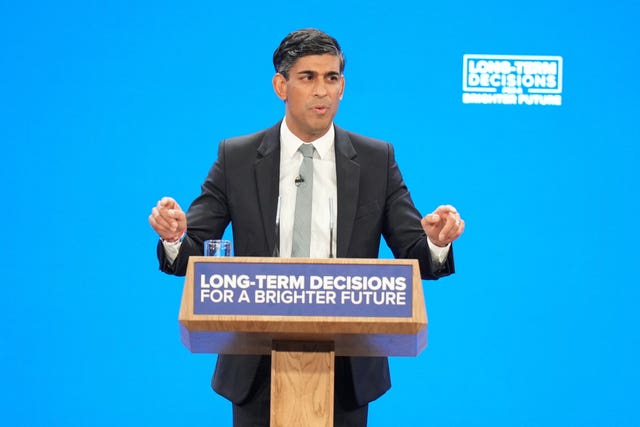The Government will introduce a single qualification “the Advanced British Standard” bringing together A-levels and T-levels, the Prime Minister has said.
Rishi Sunak said students will typically study five subjects rather than three under the planned shake-up of the post-16 education system in England.
The reforms would see all pupils study some form of English and mathematics until the age of 18.

But a headteachers’ union has warned that the plans are “likely to prove a pipe dream” in light of teacher shortages – unless the Government committed to a broader strategy to improve teachers’ pay, conditions and education funding.
Under the plans for the new baccalaureate-style qualification, 16 to 19-year-olds would take a larger number of subjects at both “major” and “minor” level, with most studying a minimum of five subjects at different levels.
Pupils starting primary school this term were expected to be the first cohort to take the new qualification – and once fully rolled out, the Advanced British Standard would replace A-levels and T-levels, No 10 said.
Mr Sunak told the Conservative Party conference: “We will introduce the new rigorous, knowledge-rich Advanced British Standard, which will bring together A-levels and T-levels into a new single qualification for our school leavers.”
The Prime Minister added that students in sixth forms and colleges would spend more time in the classroom under the Advanced British Standard.
Mr Sunak told the conference: “First, this will finally deliver on the promise of parity of esteem between academic and technical education, because all students will sit the Advanced British Standard.
“Second, we will raise the floor ensuring that our children leave school literate and numerate because with the Advanced British Standard all students will study some form of maths and English to 18 with extra help for those who struggle most. In our country, no child should be left behind.”
He added: “A-level students generally only do three subjects compared to the seven studied by our economic competitors.
“The Advanced British Standard will change that too, with students typically studying five subjects and thanks to the extra teaching time we are introducing, the great breadth won’t come at the expense of depth which is such a strength of our system.”
The Prime Minister has announced an initial investment of £600 million over two years to lay the groundwork for delivering the Advanced British Standard.
This will include funding for tax-free bonuses of up to £30,000 over the first five years of their career for teachers in key shortage subjects.
A consultation on how to implement the qualification will open this autumn.

Geoff Barton, general secretary of the Association of School and College Leaders (ASCL), said: “While the principles of these proposals are good, the practicalities are daunting because of the severity of the teacher recruitment and retention crisis.”
He added: “We’re not convinced that the Prime Minister’s plan for an early career bonus payment for teachers in key shortage subjects in schools and colleges will be anywhere near enough.
“Teacher shortages are widespread and very problematic in many subjects. This problem requires a much broader strategy to improve pay, conditions and education funding.
“Without this commitment, the Prime Minister’s plans for an Advanced British Standard are likely to prove a pipe dream.”
Paul Whiteman, general secretary of school leaders’ union NAHT, said: “To date, there has been no meaningful engagement with the profession on any part of this announcement.
“Whilst the Government may suggest that this is just the start of a process towards further reform, it would appear they have already decided on the destination without talking to school leaders.
“Once again, there is a sense that ministers in Whitehall think they know better than the teachers and leaders working with pupils on a daily basis.
“The announcement raises so many questions, most importantly where all the additional teachers needed to deliver these reforms will come from.
“There are also huge questions around what this means for the curriculum and for higher education.”
